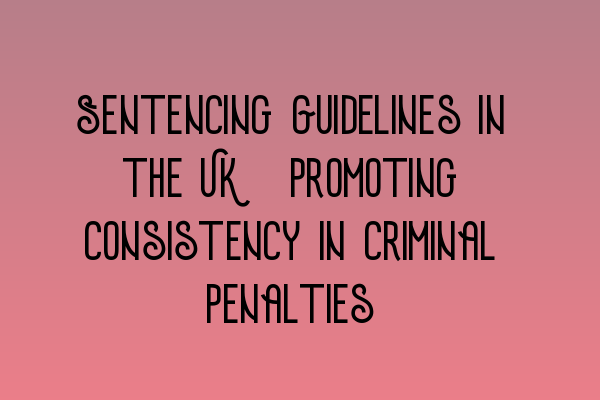Sentencing Guidelines in the UK: Promoting Consistency in Criminal Penalties
Introduction
When it comes to criminal law in the UK, maintaining consistency in sentencing is crucial. Sentencing guidelines play a significant role in ensuring that criminal penalties are fair and proportionate. From minor offenses to serious crimes, these guidelines help judges and magistrates determine appropriate punishments based on the circumstances of each case. In this blog post, we will explore the importance of sentencing guidelines and how they promote consistency in criminal penalties.
Why Sentencing Guidelines Matter
Sentencing guidelines serve as a framework for judges and magistrates to determine the appropriate sentences for convicted individuals. They aim to ensure consistency and fairness in delivering justice by providing guidance on the factors to be considered when determining a sentence.
Without sentencing guidelines, there is a risk of inconsistency in criminal penalties, as different judges may interpret the law differently and hand down different punishments for similar offenses. This lack of consistency can undermine public confidence in the legal system and lead to a sense of injustice.
Promoting Consistency through Sentencing Guidelines
1. Transparency and Predictability
Sentencing guidelines bring transparency and predictability to the criminal justice system. By clearly outlining the factors that should be taken into account during sentencing, these guidelines provide a transparent process that the public can understand. This transparency promotes trust in the legal system and ensures that the same offense is met with a consistent penalty.
2. Consideration of Aggravating and Mitigating Factors
Sentencing guidelines take into account both aggravating and mitigating factors when determining a sentence. Aggravating factors are circumstances that make an offense more serious, such as premeditation or use of a weapon. Mitigating factors, on the other hand, are circumstances that may reduce the seriousness of the offense, such as remorse or lack of previous convictions.
By considering these factors, sentencing guidelines ensure that the punishment fits the crime and takes into account the individual circumstances of each case. This approach promotes consistency in sentencing by providing a structured process for judges and magistrates to consider all relevant factors.
3. Relevance of Previous Cases
Sentencing guidelines also help judges and magistrates consider previous cases when determining appropriate penalties. They provide a reference point by outlining the sentences previously handed down for similar offenses. This use of precedents ensures that similar offenses are treated uniformly and helps prevent significant disparities in sentencing.
The Role of the Solicitor in Sentencing
As a solicitor, your role in sentencing involves advocating for your client and presenting their case in the most favorable light. This includes arguing for leniency based on relevant mitigating factors and highlighting any inconsistencies or errors in the prosecution’s case.
In addition, being well-versed in the sentencing guidelines is crucial for a solicitor to effectively represent their client. By understanding the guidelines, you can provide accurate advice and help your client understand the potential consequences of their actions.
Conclusion
Sentencing guidelines in the UK play a crucial role in promoting consistency in criminal penalties. They provide a structured framework for judges and magistrates to determine appropriate sentences based on the circumstances of each case. By ensuring transparency, considering aggravating and mitigating factors, and referencing previous cases, these guidelines help deliver fair and proportionate punishments.
As a solicitor, it is essential to familiarize yourself with the sentencing guidelines to effectively represent your clients. By doing so, you can ensure that their rights are protected and that they receive a fair sentencing outcome.
Learn more about criminal law and practice in the UK:
– Prepare for your SQE exams with our SQE 1 Practice Exam Questions.
– Get valuable practice with our SQE 1 Practice Mocks FLK1 FLK2.
– Equip yourself for success with SQE 2 Preparation Courses.
– Master the foundations with SQE 1 Preparation Courses.
– Stay up-to-date on SRA SQE Exam Dates.
Remember, understanding sentencing guidelines is crucial for any lawyer practicing criminal law in the UK. By promoting consistency in penalties, these guidelines not only ensure justice but also maintain public trust in the legal system.
